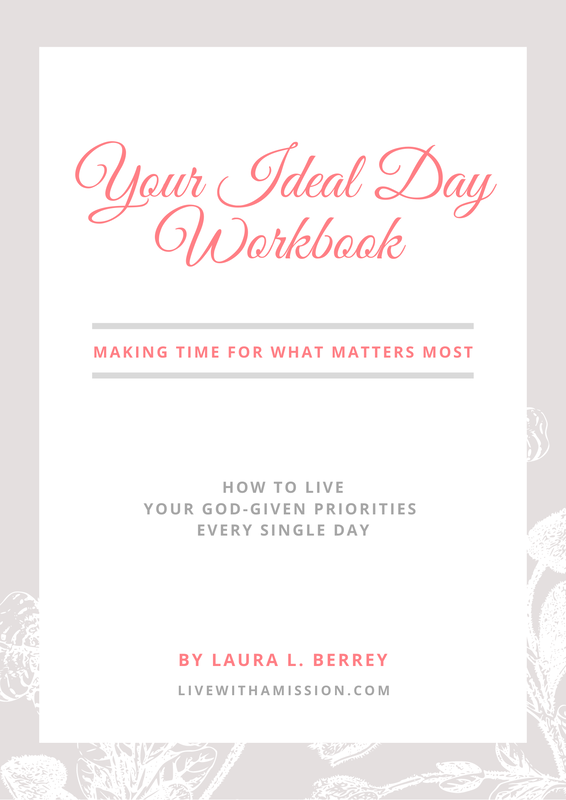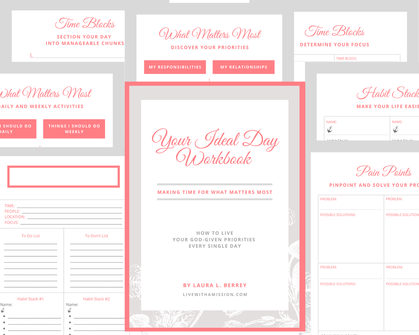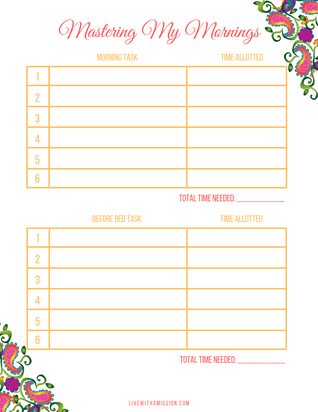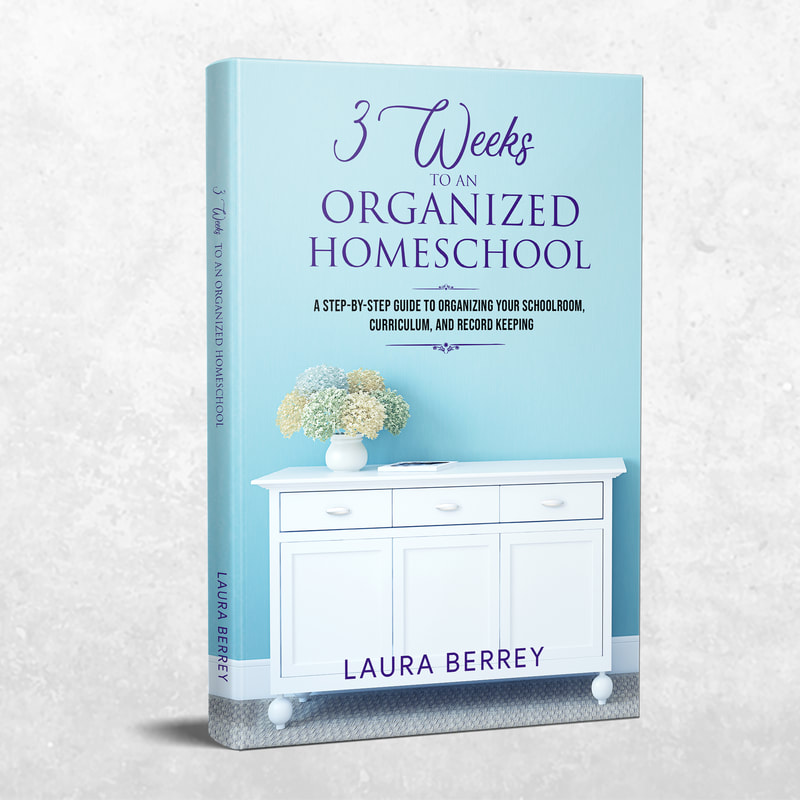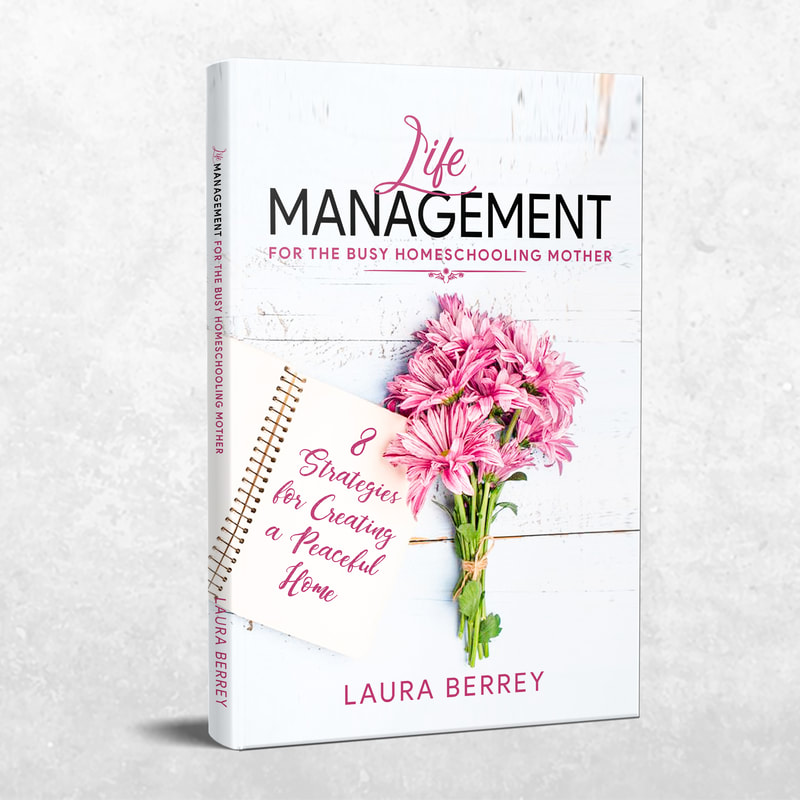|
Your Ideal Day: Making Time for What Matters Most. I recently did a session at the Keystone Christian Educators Association annual conference on the topic of Your Ideal Day: Making Time for What Matters Most. It was a blessing to me to work back through systems I have created over the years for managing my days. For those interested in working through their own ideal day, I've posted the Your Ideal Day Workbook for download. You can access it here.
(The workbook has brief instructions included in it for how to use it.)
0 Comments
A home that always stays clean is either a myth or a fairy tale. However, it is possible to never (or rarely) wake up to chaos! When you are homeschooling and your children are home all day (or if you are running them around town to all their activities and co-op sessions), your home can quickly go from tidy to chaotic. Don't let this stress you! View this as normal. Whoever said that the key to happiness is low expectations is mistaken. However, contentment often comes on the heels of realistic expectations. I've found that if I have high expectations of cleaning my home and it still being clean six hours later, I'm frustrated if it isn't. But if I expect there to be normal wear and tear going on all day long, I'm content with a certain level of chaos. But contentment doesn't mean we sit back and allow it to continue. Contentment means we calmly address the disorder at the correct time. Now, as much as I cherish a clean, tidy house, I cannot walk around behind my kids all day long, picking up their strewn belongings. Nor do I want to be a nag. On the other hand, I'm not content to wake up in the morning to absolute chaos. So here's what I do about it. Don't Wake Up To Chaos!I have found a three-part solution to keeping the chaos at bay. This is important to me, because chaos and clutter is amazingly distracting. In order to be able to focus on my work and to experience peace and joy, I need a certain level of order. Part One: Nightly clean up. I start at night. Before going to bed, I try to make sure certain jobs are done. The dishes must be washed. The kitchen must be somewhat tidy. The laundry must be clean, folded, and given to my children to be put away. There are other jobs I like to have done, and depending on our circumstances, I aim for: bedrooms clean, bathroom wiped down, hallway empty of piles, and dishes dried and put away. I would love to say that I go to bed every night with a thoroughly clean house, but that would be a fairy tale. But I rarely go to bed when my house is in absolute chaos. Part Two: Morning Chores. In addition to cleaning up before heading to bed (and I'm not a night owl, so that means it’s a stretch for me), we have several times when we work together as a family to tidy up the house. The first of these times is during our morning chores. In our house, chores are not distributed just for the purpose of giving our children something to do. I've portioned out the most important things that need to get done every day in order to maintain the household. That means everybody has a chore in the morning that directly contributes to household management. My children take out the trash, carry down the laundry, take care of the cat, sweep the upstairs hallway, do a quick wipe down of the two bathrooms, and make breakfast. (This is evenly distributed: each person has one chore that shouldn't take more than 5-10 minutes.) In addition to this, we work together to put furniture in place, clean off coffee tables, put away scattered music, and clear the floors of toys, balls, and skateboards. Thankfully, there usually isn't much to do in the morning because of… Part Three: Evening Clean Up. We have a second, similar clean up late in the afternoon or early evening, often after dinner. We put away all the homeschool materials and books, musical instruments, and toys. Clean clothes are put away. Books are shelved. Games are finished and put away. (Are we the only family with board games going on practically 24-7? Unless it is Axis and Allies, I prefer it not to be left out overnight.) In addition to these three quick-cleaning times, we also have a policy of washing dishes immediately after every meal. With no dishwasher, this is a big task. But it has to be done, so why not right away? I find that the kitchen is not only the heart of the home, it is the also the thermometer of my homemaking diligence. If it is clean, the rest probably is too. If it is a mess, you don't have to peek into closets to know they are likely a mess too. These are our cleaning times. Over the years, as my family has grown (both numerically and in the physical size of bodies), the Lord has had to give me more and more grace to close my eyes to messes that arise in between. I do ask my children to put their toys away if they have moved on to a new activity, but I don't stress over it in general. This is part of a balanced life: choosing to focus on certain things at certain times and ignoring them at all other times. And this is the system that helps me--and can help you--to never wake up to chaos. Here's How...Start by asking yourself what the non-negotiable chores are for your home--the chores that make the biggest difference. Is there a way you can divvy them up to your children? Or are there tasks you can do right before bed or early in the morning so that they are off your plate for the rest of the day?
Plan in at least one (or up to three) 5-10 minute clean up times each day. (If this is new to your family, start with one.) What are good times to do this? Right before or after a meal is great, since the whole family is usually already congregated together at those times. Choose a time of the day when you and your children are not on low battery power so you can avoid melt-downs. (Another reason to choose a time following a meal.) Whatever time you schedule for this, tie it to another activity so it gets done every day! For instance, you could do it right before Daddy gets home from work (so he can enjoy a peaceful evening) or right after (so he can help oversee it). Or you could do it right before outside play time (so the kids get it done fast instead of dragging their feet). Or right after morning snack time. These are all logical times to take a quickie time-out from homeschooling to do a bit of tidying. Put on some fun music or an audio drama while everybody cleans. Follow them around and supervise. It helps if I hand someone an item and tell them exactly where they are to put it. ("This goes in the pink basket on the bottom shelf of the hallway closet.") Remind them it gets put away, not just dropped at the top of the stairs or on the floor of someone's bedroom. When done, thank them for their help. Your family is a team: you play together, eat together, and work together. Each person's help and presence is needed and blesses the team as a whole. It's no fun at all to wake up to chaos. Thankfully, you don't have to! Wake up to a tidy home tomorrow morning. "Pay yourself first" is a commonly touted financial proverb that can also apply to time management. Financially, paying yourself first means that the first portion of your money (after your tithe) goes into savings. Financial advisers know that the person who watches their savings account increase will also be the person who is paying off debt and carefully watching their spending. They also know that if we wait until the end of the month or paycheck period to see if we have any money left we can save, there likely won't be any. But money management and time management have a lot in common: both get consumed to their limit. Parkinson's Law says that our work expands to fill our time. Deadlines are to work what a budget is to money. Therefore, just as we should squirrel the first bit of our money away for saving (generally by direct deposit, so we aren't tempted to circumvent our plan), we should also squirrel away the first bit of our time. This is why mastering our mornings is so vital! We must do the most important things first. What are the most important things? Everyone will have different items on their VIP (Very Important Plans) task list. Here are mine, just as an example: 1. Devotions. A non-negotiable. I'm a sinner by nature; without the Word of God transforming me each day, I'm even worse. I need it more than I need anything else in my life, so this is my number one. 2. Planning. If I fail to plan, I plan to fail. To win my day, I must plan it out. I need to know my most important and most urgent tasks of the day. I need to know what I'm cooking and defrost meat. I also need to know what is coming up in my life so I can prepare for these events. 3. Exercise. In order to accomplish everything else in my day, I need the energy and stress relief I get from exercise. If I don't do it early, it probably won't get done. 4. Writing. Writing is a creative task. I can do laundry, cook, and clean my house on autopilot, but I can't write on autopilot. Writing requires all my mental synapses to be firing. The very best time for me to write is immediately after exercising. I've learned this through massive amounts of trial and error, so this is what I do if I want to be productive. 5. Work. I have a few tasks I start even before breakfast. Laundry is one of them. In an effort to automate my life (which is what I need to do in order to run a semi-clean home and provide clothes and food for my family without interrupting our regularly scheduled programming), I plan to start laundry early in my day and keep it going by checking in on it regularly. I also try to defrost meat, clean my bedroom, and oversee my children's chores (which are the tasks which most need to be done each day in order to keep my home functional). 6. Get ready for the day. This means dressed to my shoes, shower, hair, makeup. If I am doing a massive housekeeping project that day, I might stay in my workout clothes for a few hours. Never my pjs. Never. Nobody is truly productive in their pjs. Frankly, I'm not even productive in my workout clothes, so even this is super rare. How can you pay yourself first when it comes to your time?Make a short list of your VIP tasks. Don't start with mine; you need to create your own. Also, don't make a long list. If you are new to paying yourself first, start with one item. Two at the most. You need to set yourself up for success!
Think through your morning schedule. What time will you need to get up in order to accomplish these tasks before moving into your normal daily life? Right now, set your alarm for tomorrow at that time. Make that time a non-negotiable. Even if you are tired when your alarm goes off, roll yourself out of bed. Don't use snooze. Your body will adjust; just plan to go to bed early tomorrow night. Prepare for tomorrow as if your life depends on it. Because it does! Our lives are just a vapor, quickly vanishing away. If we want to redeem the time in this present evil day, we have to be proactive. Those who fail to be proactive end up fiddling their life away. I find that having a rock-solid plan for the morning—a mental model of what my morning should look like—allows me to set myself up for success the night before. I fill the coffee pot at night, lay out my exercise clothes, mentally sort through my tasks and appointments for the day, plan out my meals, and do a swift walk-through of my house so I don't wake up to chaos. It only takes a few minutes to do these things, but it effectively leverages my time. Start now! Use this free worksheet to make a plan to master your mornings. |
About the Author
Hi, I'm Laura. I've been homeschooling for over fifteen years. I have six children and I'm married to my best friend.
My Books
Sign up to hear about sales or new books and I will also send you a free printable Homeschool Planner.
Archives
September 2022
Categories
All
|

